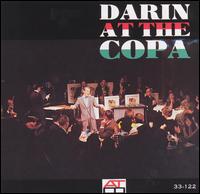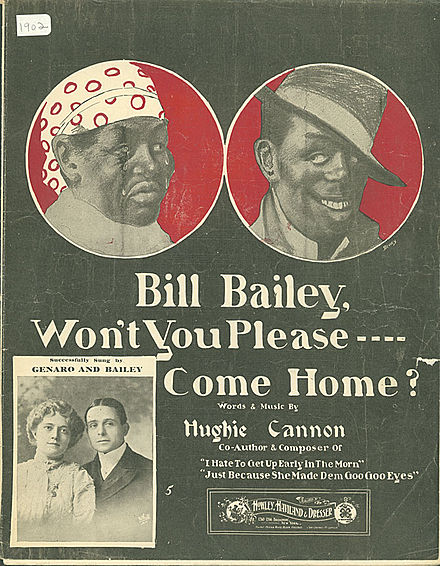"Die Moritat von Mackie Messer" is a song composed by Kurt Weill with lyrics by Bertolt Brecht for their music drama Die Dreigroschenoper, or, as it is known in English, The Threepenny Opera. It premiered in Berlin in 1928 at the Theater am Schiffbauerdamm. The song has become a popular standard recorded by many artists, including a US and UK number one hit for Bobby Darin in 1959.

"Shake, Rattle and Roll" is a twelve bar blues-form song, written in 1954 by Jesse Stone under his songwriting pseudonym of Charles E. Calhoun. It was originally recorded by Big Joe Turner and most successfully by Bill Haley & His Comets. The song as sung by Big Joe Turner is ranked #127 on the Rolling Stone magazine's list of The 500 Greatest Songs of All Time.
"Oh My Darling, Clementine" is an American western folk ballad in trochaic meter usually credited to Percy Montrose (1884), although it is sometimes credited to Barker Bradford. The song is believed to have been based on another song called "Down by the River Liv'd a Maiden" by H. S. Thompson (1863). It is commonly performed in the key of F Major. Members of the Western Writers of America chose it as one of the Top 100 Western songs of all time.
"You'll Never Know" is a popular song with music written by Harry Warren and the lyrics by Mack Gordon. The song is based on a poem written by a young Oklahoma war bride named Dorothy Fern Norris.

"I've Been Working on the Railroad" is an American folk song. The first published version appeared as "Levee Song" in Carmina Princetonia, a book of Princeton University songs published in 1894. The earliest known recording is by the Sandhills Sixteen, released by Victor Records in 1927.
"When the Saints Go Marching In," often referred to as "The Saints," is a black spiritual. Though it originated as a Christian hymn, it is often played by jazz bands. This song was famously recorded on May 13, 1938, by Louis Armstrong and his orchestra. The song is sometimes confused with a similarly titled composition "When the Saints Are Marching In" from 1896 by Katharine Purvis (lyrics) and James Milton Black (music).

"After the Love Has Gone" is a 1979 hit single for Earth, Wind & Fire, written by David Foster, Jay Graydon, and Bill Champlin for the album I Am. It held the #2 spot on the Billboard Hot 100 singles chart for two weeks, behind The Knack's smash hit "My Sharona".

Darin at the Copa is Bobby Darin's fourth album and third straight top-ten charting LP in the US. It debuted on 17 October 1960, peaked at number 9 and remained in the LP chart for 38 weeks. The album was recorded live at the Copacabana nightclub in New York.
"Frankie and Johnny" is a traditional American popular song. It tells the story of a woman, Frankie, who finds her man Johnny making love to another woman and shoots him dead. Frankie is then arrested; in some versions of the song she is also executed.
"The Shadow of Your Smile", also known as "Love Theme from The Sandpiper", is a popular song. The music was written by Johnny Mandel with the lyrics written by Paul Francis Webster. The song was introduced in the 1965 film The Sandpiper, with a trumpet solo by Jack Sheldon and later became a minor hit for Tony Bennett. It won the Grammy Award for Song of the Year and the Academy Award for Best Original Song. In 2004 the song finished at #77 in AFI's 100 Years...100 Songs poll of the top tunes in American cinema.
"Buffalo Gals" is a traditional American song, written and published as "Lubly Fan" in 1844 by the blackface minstrel John Hodges, who performed as "Cool White." The song was widely popular throughout the United States, where minstrels often altered the lyrics to suit local audiences, performing it as "New York Gals" in New York City, "Boston Gals" in Boston, or "Alabama Girls" in Alabama, as in the version recorded by Alan Lomax and Shirley Collins on a 1959 field recording trip. The best-known version is named after Buffalo, New York.
The New Alice in Wonderland is a 1966 American animated television special written by Bill Dana and produced by Hanna-Barbera. It was broadcast on the ABC network on March 30, 1966, in an hour slot. The songs were written by composer Charles Strouse and lyricist Lee Adams, who were most famous for Bye Bye Birdie. The songs were orchestrated by Marty Paich, who also provided musical direction; plus devised and arranged that part of the underscoring that was drawn from the musical numbers. The rest of the underscoring was drawn from the vast library of cues that Hanna-Barbera's in-house composer Hoyt Curtin had written for various animated series.
"Stella by Starlight" is a popular song by Victor Young that was drawn from thematic material composed for the main title and soundtrack of the 1944 Paramount Pictures film, The Uninvited. Appearing in the film's underscore as well as in source music as an instrumental theme song without lyrics, it was turned over to Ned Washington, who wrote the lyrics for it in 1946. The title had to be incorporated into the lyrics, which resulted in its unusual placement: the phrase appears about three quarters of the way through the song, rather than at the beginning or the end.
Through its history, Hanna-Barbera has operated theme park attractions, mostly as a section in Kings Island, Carowinds, California's Great America, Kings Dominion, Canada's Wonderland, and recently, Six Flags Great America.
"Baby Won't You Please Come Home" is a blues song written by Charles Warfield and Clarence Williams in 1919. The song's authorship is disputed; Warfield claims that he was the sole composer of the song.
"Meet the Flintstones", also worded as "(Meet) The Flintstones", is the theme song from the 1960s animated television series The Flintstones. Composed in 1961 by Hoyt Curtin, Joseph Barbera and William Hanna, it is one of the most popular and best known of all theme songs, with its catchy lyrics; "Flintstones, meet the Flintstones, they're the modern Stone Age family".

Winners is an album by American singer Bobby Darin, released in 1964, two years after Bobby had left ATCO and moved to Capitol.
Bourbon Street Parade is a popular jazz song written by drummer Paul Barbarin in 1955. The song is an example of how early marching bands influenced New Orleans jazz. It has become a Dixieland classic and New Orleans Jazz standard.















